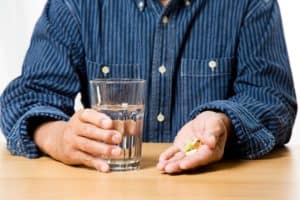What Are Prostate Supplements?
When the prostate becomes larger than usual, your doctor may prescribe medication to help keep things under control. Unfortunately, some prescription medications come with side effects. Many patients looking to avoid these side effects turn to supplements to improve their prostate health without the added drug combinations.
The problem with this is that supplements are not regulated in the same way prescription drugs are. That means the efficacy has not been fully studied nor has the side effects. Just because the supplement seems natural, doesn’t necessarily mean it is the right fit for you – or anyone!
What Is BPH?
When it comes to prostate health, you may hear the term BPH thrown around a lot, but what does it mean? Firstly, it stands for Benign Prostatic Hyperplasia. This refers to an enlarged prostate gland. The first symptom of BPH is trouble urinating or a feeling of not being completely empty after urinating. If left untreated, eventually the prostate will enlarge so much, it will block the urine stream altogether. This requires emergency medical intervention.
Treatment for BPH may include medications, minor surgery, or a change in diet and lifestyle. The best way to prevent BPH is to point out any difficulties you may have urinating with your physician. He or she will order tests to diagnose BPH. The sooner it is detected, the more easily it can be treated. Unfortunately, if BPH is left untreated for too long, it may lead to the eventual loss of the prostate.
What Is the PSA Test?
The PSA test is a blood test that screens for prostate cancer. This test detects how much PSA – prostate-specific antigen – is in the blood. It is normal to have some levels of PSA in the blood, but elevated levels of PSA may mean something is wrong.
Your physician will conduct several diagnostic tests to rule out prostate cancer. PSA is the very first test to be expected if prostate cancer is suspected.
What Causes Prostate Problems?
BPH is the most common prostate problem. By age 60, over 50% of men will experience an enlarged prostate. As the urethra becomes more narrow due to pressure from an enlarged prostate, the bladder muscles become thicker and thicker. This actually results in more damage to the prostate gland, causing even more enlargement. This is a normal part of aging, in most cases. Prostate problems also worsen when a BPH problem is left untreated.
Age
Prostate problems may start for some men after age 50. Though half of the men will experience some prostate problem by age 60, that number jumps up to 90% by age 80.
Food and Activities to Avoid
To promote good prostate health, you need to start with a proper diet. Foods like red meat, dairy products, alcohol, and saturated fats are all foods in which you should be reducing consumption. While you don’t need to avoid them altogether eating less is a good idea if you wish to promote your prostate health.
Regular exercise is recommended for those looking to protect their prostate health – or their health in general. Walking is an excellent exercise that may provide many benefits for your prostate and your health in general.
Prostate Supplements: How Do They Work?
Prostate supplements work by producing hormone-blocking properties and by reducing inflammation. Prostate supplements like saw palmetto have actually been proven to help protect the prostate.
Prostate Supplement Myths
The biggest myth is that most people believe if prostate cancer isn’t an issue, they are not at risk. However, we know that other prostate problems like BPH can be just as dangerous to your health if left untreated. So a clean bill of health in terms of cancer does not mean your prostate is as healthy as it should be.
Common Prostate Supplements
Common supplements used to promote prostate health are saw palmetto, beta-sitosterol, pygeum, and rye grass pollen extract.
Natural Prostate Supplements
Most supplements for prostate health contain natural, herbal mixtures that work differently than prescription medications do. To be safe, don’t simply take any supplements with the word “natural” on it. Look for products made from natural ingredients that have been studied. Here are some of the best choices for you:
Saw Palmetto
While supplements are not fully regulated, more and more studies are being conducted every day. It is important to gravitate towards the supplements that have the most studies behind them.
Beta-Sitosterol
Beta-sitosterol is an herbal combination of the medicinal African plum tree plants. This prostate supplement has also been studied a great deal. While long-term effects have not yet been studied, improvements in prostate health have been observed so far.
Foods for BPH
To control or prevent an enlarged prostate, a healthy diet is crucial. Start by eliminating the fatty foods mentioned above and introduce more fruits and vegetables in your diet. Foods like sesame seeds, salmon, pumpkin seeds, tomatoes, and avocados are known to help treat and prevent enlarged prostate problems like BPH.
At What Age Should Men Start Taking Prostate Supplements?
Generally, there is no need to add a prostate supplement to your routine prior to age 50. By age 60, prostate health concerns will become a reality for half of men, so this may be a great time to start taking prostate supplements if they are in fact, right for you.
Do Prostate Supplements Have Side Effects?
Yes – but this goes for anything. Any medication you take – natural or not – may have adverse effects on you, especially if you take other medications. While most side effects include nausea and other minor inconveniences, long-term side effects have not yet been fully studied.
This does not imply that there are no long-term side effects. However, at this time, they are still unknown.
 Talk to Your Doctor First
Talk to Your Doctor First
Just because something is important for a particular health condition, doesn’t mean you are the right candidate for it. Based on your personal health status and your current list of prescribed medications, your physician will be best informed to help you in deciding to introduce prostate supplements or not.
There are many benefits to taking prostate supplements. They can help boost your immune system to prevent blockage of the urethra and improve overall prostate health. While it is most likely safe for you, it is always advised to seek medical advice first.
How Can I Protect My Prostate Health?
As men age, prostate conditions become unavoidable for most men at some point. The most important thing you can do – besides a healthy diet and exercise – is to take signs and symptoms of prostate abnormalities seriously.
Aging can be an emotionally difficult process for both men and women. Prostate concerns may be synonymous with “getting old” – a reality many aren’t ready to accept. However, denying yourself proper medical care in the face of a real could have disastrous consequences. If left untreated, BPH can result in the loss of the prostate or the kidneys. Your health and your life are on the line. If you notice any trouble or difficulties with urination, see a doctor immediately, and describe your symptoms.
How Do I Prevent BPH?
If you want to prevent prostate enlargement, stay active. Moving regularly will help encourage the flow of urine. This will prevent urine from building up and narrowing the urethra, which puts pressure on it and forces the gland to swell. Staying fit and active is important for your prostate health. You don’t need to lift heavy weights and pump iron like a bodybuilder. Just take care to keep moving. Light intensity exercises like walking can be just as beneficial to your health. You don’t necessarily need to sweat up a storm to be healthy.
You can also help prevent prostate cancer by reducing foods and drinks that are not good for your health. Excessively fatty diets or overconsumption of alcohol on a regular basis can worsen prostate problems by causing more protein build-up in the urethra, leading to blockage, and other complications.
What Happens If My Prostate Needs To Be Removed?
In most cases, removing only part of the prostate can help reduce the inflammation of the prostate and allow you to resume normal activities. However, in some cases, total removal of the prostate is necessary. Urinary incontinence and erectile dysfunction are the most common side effects of prostate removal.
Though these side effects are not pleasant, removal of the prostate is a last resort and intended to help save your life. Your medical team will work together with you to help find the best solution possible for you before committing to complete removal of the prostate.
Should I Start Taking Prostate Supplements?
The idea of what could happen to your prostate as you age can be scary. Preventative treatment through supplements can be beneficial to you, especially if you have a history of prostate problems in your family.
If you want to get a heads up on prostate problems, look for a supplement that does not interact with any of your other medications and get your doctor’s approval before moving forward. Though most prostate supplements have not been proven to be unsafe in any way, it is always best to get the advice of your physician or pharmacist before making any changes to your life.
Can Prostate Problems Be Reversed?
While prevention is key, prostate problems do not always leave behind permanent side effects. Usually, if caught early enough, BPH can be treated through medications or possibly minor surgery.
Prostate Symptoms to Look Out For
If you notice you are having trouble emptying your bladder fully, make an appointment with your physician. Other symptoms of BPH and other prostate complications include blood in the urine, urinary irritation, urinary tract infections, and inflammation of the prostate.
If you notice one or more of these symptoms, do not hesitate to seek medical help. And remember, doctors are on your side. Their goal is to help you keep your prostate and maintain a full and happy life!








